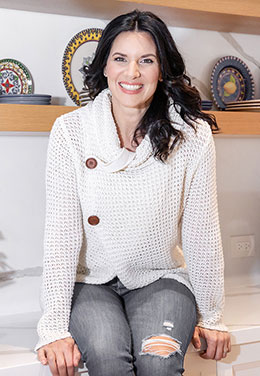Do you know what grinds my gears? What really drives me up the wall?
When people approach me with minor imperfections that they can’t seem to live with, looking for help to “fix” their flaws. People are often looking to achieve a level of “perfection” rather than wanting to improve their health.
Okay, full disclosure: I was that person too, once!
Needing everything in its place, punctual, detail-oriented.
Constantly striving for the perfect butt, waist, arms.
Never feeling good enough.
I’d spend my days analyzing every little imperfection, thinking that if I could just muster up enough motivation, create a better fitness routine, quit sugar, give up wine for good… then I would have a perfect life. I’d be more intelligent, better looking, perfect.
After all, other people seem perfect; why shouldn’t I be able to achieve that too?
WRONG!
No matter how “perfect” a person seems, there is some form of imperfect shit lurking beneath the surface. And, trust me, they are exhausted trying to hide it; I know I was.
I’ve also heard this same issue time and time again from my clients.
For the most part, in our everyday lives, perfection is an illusion.
Fortunately, perfectionism and it’s lies are becoming an outdated concept.
More people are embracing being honest and exposing the lack of perfection in their lives.
Frankly, I’m just grateful that we can all finally drop the charade.
When Perfectionism is Important
I do believe that there is a time and place to strive for some level of perfection.
If you’re a surgeon; please feel free to strive for a perfect outcome during my surgery ?.
Also, if you’re a carpenter, I’d certainly love perfectly straight walls – that would be AWESOME!
Or if you’re competing for a gold medal in the Olympics; that sounds like a great time to over-analyze your every move for the BEST possible outcome.
When Perfectionism Needs to Go Away
Let’s face it: because we’re all comparing ourselves to one another on social media, the idea of being “perfect” has gotten a little out of hand.
It’s beginning to creep into places where it doesn’t belong: like our thoughts about ourselves.
So, I’m here to tell you to STOP IT!
Just STOP! NOW!!!
Yes, it’s easier said than done.
Especially for those of us who have embedded perfectionism as an involuntary thought in our approach to life. However, for the rest of us, that permission to give up the act is a relief, like “Seriously? I can stop? Sweet. I’m done!”
If you struggle with perfectionism, I honestly do empathize with you.
I often call myself a “recovering perfectionist”.
But with a little practice, you too can become a “good-enough…er” in no time.
And, trust me, there is far less stress and anxiety in “good enough land”!
The (Almost) End
Sorry if I was a little harsh at the beginning of this blog.
I truly don’t mean to minimize what is important to you.
My goal is to help you to break the cycle of negative self-talk, because, for most overly-obsessed perfectionists, that’s the root cause of their desire to be perfect; their nagging inner voice.
We all know that in “perfection land” we can be overly critical and often antagonize those we love.
If you’re looking to begin living a more relaxed approach to life, read the three steps below to begin to ease the burden of perfectionism.
3 STEPS TO GET YOU ON THE PATH TO RECOVERY:
STEP 1: Repair your unconscious perfectionist mentality
Perfectionists love to use words with absolutes, especially the word “should”.
They think and speak about what they should do rather than what they are truly doing.
The hard truth is that this type of talk can create a ton of unnecessary stress and anxiety around the idea of failure.
Rather than saying “I should be exercising right now instead of Netflix-ing”, allow yourself time throughout the week to NOT accomplish anything. Downtime and zoning-out are important for your health and success, too.
STEP 2: Stop comparing yourself to others
If we constantly compare every part of our life to some perceived “perfect” idea, we’ll be pretty upset most of the time. Humans are naturally imperfect and we can’t control every single thing going on around us (even if we try to).
Not everything we do needs to be a complete success.
Being flawed is human; it’s authentic and real.
Accepting and embracing our flaws is a much more natural thing to do.
Once you do, you’ll find that the need to compare yourself to others begins to fade away.
STEP 3: Celebrate your imperfection
It might feel like a massive stretch to celebrate.
Maybe you need baby steps. Maybe before celebrating you just need to finally admit to yourself that you are imperfect.
Mental health writer and advocate, Therese J. Borchard, says, “Each big blunder deserves a round of toasts. Because almost all of them teach us precious, rare lessons that can’t be acquired by success. Nope, the embarrassment, humiliation, self-disgust … all those are tools with which to unearth the gold.”
We’ve all learned our biggest lessons through mistakes, so it’s time to fully, wholeheartedly, accept the fact that we are ALL imperfect. You too, you self-identified perfectionist!
WELCOME TO THE “GOOD-ENOUGH” CLUB!
References:
https://www.wikihow.com/Control-Perfectionism
https://everydaypower.com/deal-with-being-perfectionist/
https://psychcentral.com/blog/10-steps-to-conquer-perfectionism#1


